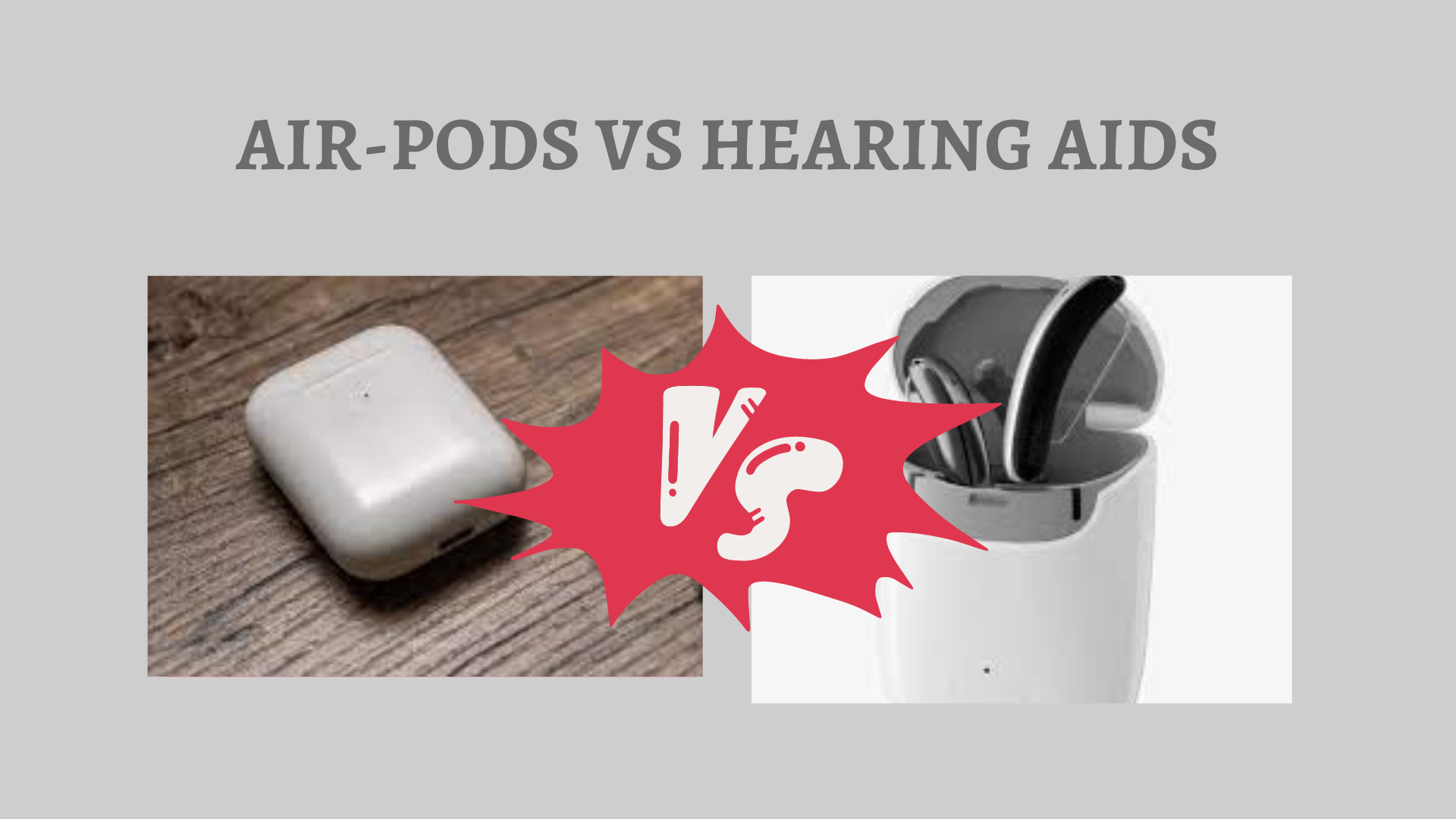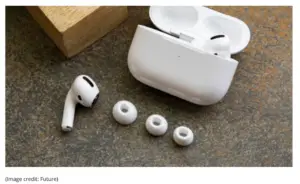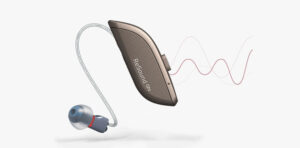Unveiling the ultimate showdown: Air Pods vs hearing aids. Delve into this comprehensive comparison to discover the perfect audio companion for your needs. Explore the world of crystal-clear sound, seamless connectivity, and personalized fitting. Can Air Pods bridge the gap for those with hearing impairments? Uncover the truth and make an empowered choice. Elevate your audio experience today with this emotional journey through the realms of technology and accessibility.

In today’s technologically advanced world, we have witnessed remarkable advancements in the field of audio devices. Two popular options for audio consumption are Air Pods vs hearing aids. While Air Pods have gained significant popularity as wireless earbuds, hearing aids remain a vital tool for individuals with hearing impairments. This article aims to provide a comprehensive comparison between Air Pods and hearing aids, exploring their features, benefits, and limitations. So, let’s dive into the fascinating world of audio devices and discover the differences between Air Pods and hearing aids.
Detail Understanding of Air Pods VS Hearing Aids

Understanding Air Pods
Air Pods VS Hearing Aid’s
The wireless earbuds known as Air Pods were created by Apple Inc. and have grown in popularity with consumers. They provide an uninterrupted audio experience and simple connectivity to many Apple products. The features of Air Pods include their svelte appearance, portability, and compatibility with Siri, Apple’s virtual assistant. These wireless earbuds offer a practical choice for conversing with voice assistants, making phone calls, and listening to music.

Exploring Hearing Aids
Air Pods VS Hearing Aid’s
On the other hand, hearing aids are sophisticated tools created especially to help those who have hearing loss. There are options for behind-the-ear (BTE), in-the-ear (ITE), and completely-in-canal (CIC) designs, among others. Modern technology is built into hearing aids to amplify sounds and enhance the user’s capacity for communication and interaction with their environment. To precisely match a person’s unique hearing requirements, these devices go through calibration.
Comparison: Air Pods vs. Hearing Aids
To better appreciate the differences between Air Pods and hearing aids, let’s compare them in a number of areas:
Sound Amplification:
Hearing aids are designed specifically to amplify sounds and meet the special hearing needs of people with hearing loss. While Air Pods may reproduce sound, they lack the personalization and amplification that hearing aids provide.
Connectivity:
Through Bluetooth technology, Air Pods excel at providing seamless connectivity with Apple devices. When pairing and switching between devices, they offer a hassle-free user experience. Contrarily, hearing aids priorities improving sound quality over providing numerous connectivity capabilities.
Sound Quality:
Hearing aids place a high priority on sound clarity and understandability, ensuring that people with hearing loss can comprehend speech and other noises. For the most part, Air Pods offer a good audio experience, although they might not be able to fully compensate for some hearing problems.
Battery Life:
On a single charge, Air Pods typically provide 4-5 hours of nonstop playback; the charging case increases this amount of time. Contrarily, hearing aids are made to last a lot longer and frequently offer a day’s worth of use on a single charge.
Customization and Fitting:
Professional fitting procedures are used to ensure a precise fit and top performance for hearing aids. They are created to meet each person’s unique hearing requirements. Although comfortable for the majority of users, Air Pods do not offer the same amount of personalization or tailored fitting.
Cost:
When compared to hearing aids, which may be an expensive investment because of their cutting-edge technology and customizable features, Air Pods are more reasonably priced.
Factors to Consider in Air Pods vs. Hearing Aids
There are a number of things to take into account while deciding between Air Pods and hearing aids:
Degree of Hearing Loss:
Air Pods might be adequate for auditory needs for people with mild to moderate hearing loss. Hearing aids are typically advised, nevertheless, for severe or profound hearing loss.
Intended Usage:
Calls, entertainment, and casual listening can all be done with Air Pods. On the other hand, hearing aids are made expressly for people with hearing loss who need help communicating on a daily basis.
Lifestyle and Activities:
Take into account your way of life and the particular activities you partake in frequently. Hearing aids might offer greater speech understanding and a more inclusive listening experience if you frequently engage in social events or work situations.
Comfort and Fit:
Custom fitting ensures the best performance and comfort of hearing aids. In comparison to Air Pods, which have a one-size-fits-all design, hearing aids may offer a more customized solution if comfort is a requirement.
Budget:
Depending on the technology and features, hearing aid prices might vary greatly. Examine many possibilities within your price range while keeping your budget in mind.
FAQ
Question 1: Can Air Pods serve as hearing aids?
ANS: Air Pods were neither created or approved as a medical device to treat hearing loss. They might amplify sound, but they aren’t customized or precisely calibrated to treat certain hearing difficulties.
Question 2: How do hearing aids and Air Pods differ?
ANS: Individuals with hearing loss can hear better with the help of specialized medical devices known as hearing aids. They go through expert fitting and calibration procedures to accommodate the wearer’s particular hearing requirements. On the other hand, Air Pods are wireless earphones that are particularly made for general use and music entertainment.
Question 3: Can people with hearing loss use Air Pods?
ANS: Although they cannot replace hearing aids, Air Pods can be useful for people with slight hearing loss. Consultation with a hearing healthcare specialist who can suggest suitable hearing aid options is advised if you have a serious hearing loss.
Question 4: What are the benefits of hearing aids over Air Pods?
ANS: For those with hearing loss, hearing aids have a number of benefits over Air Pods. These include specialized amplification, personalized fitting, excellent sound quality, and compatibility with accessories and assistive listening technology.
Question 5: How do I decide between Air Pods and hearing aids?
ANS: Your particular demands will determine whether you should choose Air Pods or hearing aids. A hearing healthcare specialist should be seen if you have hearing loss and need help communicating on a daily basis. They are able to assess your hearing impairment and suggest the best course of action.
Join our community for more updates on Telegram
Conclusion
In conclusion, there are differences between the uses of hearing aids and Air Pods in the world of audio equipment. Hearing aids are specialized equipment created to meet the specific needs of people with hearing loss, whereas Air Pods are wireless earphones made for entertainment and everyday use. To make an informed choice when thinking about your audio demands, it is crucial to evaluate your level of hearing loss, lifestyle, and budget. Keep in mind that the best way to improve hearing for people with severe hearing loss is still using hearing aids.
You can read more here:
Oticon Hearing Aids: Enhancing Your Hearing Experience for a Better Quality of Life

1 thought on “Air Pods vs hearing aids: Ultimate Showdown”